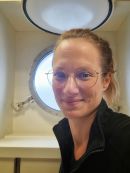
Dr. Helena Osterholz

Seestrasse 15
D-18119 Rostock
Germany
Research
I am an aquatic biogeochemist with a strong affiliation towards analytical chemistry. My research focuses on understanding the drivers of organic matter concentration and composition in freshwater and marine environments, from lakes to the deep ocean, with emphasis on the Baltic Sea.
Project "PlumeBaSe"
The anthropogenic imprint on the organic matter in coastal seas is significant. Especially in the Baltic Sea, shipping emissions contribute organic pollutants and nutrients to the water column. In the DFG-funded project PlumeBaSe we study the transport of ship emission aerosols from the smokestacks to the water column with project partners from the University of Rostock, Germany, and Charles University Prague, Czechia since 2022. Tassiana Serafim works on this project as part of her PhD thesis.
During our first project expedition with the research vessel RV Elisabeth Mann Borgese in April 2023 (EMB315), we were able to take aerosol and water samples, and deploy a 12m helium filled airship to follow ship plumes around the main shipping lanes of the southwestern Baltic Sea. You can find some impressions here: Video EMB315, days 9+10
I am also part of the Study Group "Sources, Transport and Sinks of Black Carbon in the Ocean" at the Hanse Wissenschaftskolleg for Advanced Study.
Organic Matter in the nearshore Baltic Sea
Organic matter composition and concentration in the coastal environment is driven by multiple processes, including riverine input, groundwater discharge, porewater flux, land runoff and in situ production and respiration. Especially in the first few meters near the shore, the variability is high with a strong terrigenous component. Its composition may govern the fate of emerging pollutants, that reach the ocean from land-based sources. Jann Müller studies the near-shore environment within the STB - Shallow Water Processes and Transitions to the Baltic Scale using optical and mass spectrommetry-based methods during his PhD.

